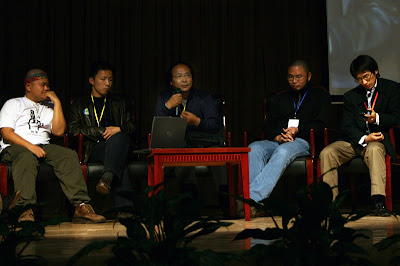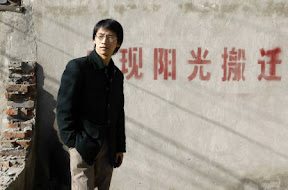 上图有翟明磊、郭卫东、张世和、温云超、周曙光,不记得从哪个手里下载下来的照片,请留言告知,我加上你的链接
上图有翟明磊、郭卫东、张世和、温云超、周曙光,不记得从哪个手里下载下来的照片,请留言告知,我加上你的链接
眼看德国之声的大奖就要在后天公开结果了,虽然前段时间据说 有黑客影响了投票结果,但我还是没有可能跟连岳这个成名已久的作家争风头,这篇报道又是英文的,虽然对我成名有推波助澜的作用,但让英语世界的人通过读我的中文BLOG来了解到我也是一件难事。再说,我这政治层面的名气无法像娱乐圈一样安全地转化为商业利益,也没什么盼头。不过,毕竟获得名气不是排在第一位的,真正要做的还是能够对环境有所改善。如果能让更多的人认清现实,思考未来,未尝不是善事一桩。 这半年来,我没受什么苦,没挨过打,仅被北京上访村的人抓伤过,血都没出,那不算什么,进局子也只是因为我打了110,总的说来,一切顺利。不敢说有成绩,至少自己算是长了见识了。虽然有人说我活到现在都算是幸运,那我的BLOG从追着封我的IP到完全解封,那就意味着什么呢?意味着有开明的趋势?
对了,我说这些话的重点应该是:拜托去投一我票吧,别让连岳赢得太轻松啊,我若完全表现得不在乎,也是对其它参赛选手的不尊重,得努力争取一把!对了,我曾牛逼闪闪地分析并预言过《 谁是当今最优秀的网络日志作者》,不相信我的就再等三天吧。连岳还不算是纯种的网络日志作者,我在zuola.com这个个人网站上写BLOG之前还不知道什么是BLOG和BSP,天生就是Blogger,而且是纯种的,不像连岳一样还可以有其它出版途径,他不仅写书,而且在报纸上有千字千元的评论可以表呢。
以下内容是引用路透社的稿件:《China’s “citizen” reporters dodge censors and critics》
BEIJING (Reuters) – China’s muzzled press and burgeoning Internet have given citizen reporters an audience and an opportunity — however fleeting — to spread news quicker than government censors can control it.
But the ability of bloggers to dodge censors and provide a voice for China’s poor and disadvantaged by covering news events Beijing would rather be left unreported has also given some bloggers the chance to profit from disseminating a rare commodity in China — uncensored news.
Zhou Shuguang, who blogs under the name of “Zola”, is a citizen reporter who found that the initial admiration he received from Internet surfers for championing the downtrodden soon turned to scorn for taking their money.
Zhou, a 26-year-old vegetable-seller from a small town in China’s heartland province of Hunan, became famous after blogging about his experiences “covering” a David-and-Goliath battle between developers and residents in the booming southwestern city of Chongqing.
“Originally I went to Chongqing with selling vegetables in mind. I thought that if I could get famous, then business would be better,” said Zhou, who was lauded, if inaccurately, as China’s “first citizen reporter” in local media reports.
The moniker was enough for the slight, bespectacled former IT student to be solicited by others battling eviction orders across China’s vast heartland, where cash-strapped local governments often collude with developers and hired thugs to seize land from powerless residents.
Zhou, who took some 7,000 yuan ($940) in donations to finance his Chongqing trip, has also taken money from residents, he insists, to cover the cost of travel and reporting on their property disputes.
“It’s travel, it’s entertainment. It’s not work,” Zhou said during an interview at a hotel in Beijing.
For desperate residents facing eviction from their homes, and unable to draw attention to their plights in China’s controlled press, it’s a price worth paying.
“In not one single case has the government been in communication with the residents. The home-owners have no way of raising their voice,” Zhou said.
GAG-ORDERS
Local propaganda offices in China regularly bar newspaper editors and TV station directors from reporting on sensitive issues such as high-profile corruption cases and disasters.
But authorities have little sway over web-savvy citizens filming embarrassing incidents and posting them on the Internet. Often by the time censors delete such postings, they’ve already been seen by tens of thousands of people.
In June, a government order scotching media coverage of a rare demonstration involving thousands of residents in the southeastern port city of Xiamen saw bloggers replace TV stations as the first source for up-to-the-minute coverage of the protest against local government plans for a toxic chemical factory.
Video footage and photos of gas-masked protesters marching in Xiamen appeared online instantaneously, spreading across blogs and chat-rooms too quickly for China’s pervasive Internet surveillance machine to intercept them.
In the same month, a letter posted on a popular local Web site claiming to be written by 400 fathers appealing for help to find their kidnapped children, ignited a national scandal leading to the rescue of thousands of adults and children forced to work as slaves in brick kilns in northern Shanxi province.
Bloggers have posted photographs and videos of unreported student riots this year sparked by anger over the wording on their graduate diplomas.
People are going through the Internet because they cannot get what they want through conventional media,” said Vincent Brossard, Asia desk chief of Reporters Without Borders, a Paris-based press rights group which ranked China 163rd out of 169 countries in a survey on press freedom last month.
Brossard estimates there are hundreds, “if not thousands”, of citizen reporters in China, despite its status as the world’s leading jailer of journalists, and where at least 50 “cyber-dissidents” remain behind bars.
Some are trained by foreign human rights groups and NGOs in the arts of multi-media reporting and many enjoy the support of local tech enthusiasts who keep their reports online, even as censors scramble to delete them.
“Some do it because they have a social commitment, or even a political commitment. Some people do it for the money, because they can get reimbursements from villagers or citizens interested in seeing their problems put on the Internet,” Brossard said.
SOCIAL RESPONSIBILITY?
While government corruption unchecked by local media may have created a market for citizen reporters to exploit, it has also created more sinister avenues for opportunists.
Scams involving journalists and people posing as journalists to demand hush money are common in China, where the Internet is also used as a platform for muck-raking and fake news.
Authorities jailed four men in October who tried to blackmail a local official by threatening to write incriminating information about government abuse of power in land usage.
In January, a local reporter for a Beijing-based newspaper was beaten to death by hired thugs during an investigation into an unlicensed coal mine in Shanxi province. Officials there said he lacked accreditation and suggested he may have been seeking payoffs in return for not reporting problems at the mine.
Zhou’s frank admission of taking payment to help residents buy domain names, set up Web sites and publicise their plights online have earned him derision from Internet surfers, many of whom initially applauded his pluck.
He remains unapologetic, however, and hits back at critics in lengthy blog posts, saying he never had any intention but to make a name for himself — and hopefully some publicity for his vegetable business in Hunan.
“I don’t want people to think I’m some kind of idol or hero,” he said. “I don’t have that responsibility. That’s the government’s responsibility.”

好,因为其他人的BLOG我从来没有看过所以我投了你一票.投票的时候在网名那一框里我差点打成周曙光.我不记得我用GOOGLE输入法曾经自定义打出过ZHOUSHUGUANG=周曙光的.看来你找GOOGLE讨说法以后GOOGLE已经记住你了.
谢谢楼上匿名的朋友的投票支持 :-)
至于输入法可以识别我的名字,那是因为搜索我名字的量比较大才可以进入输入法词组吧。个人看法,仅供参考。
湖南、长沙、岳麓区咸嘉湖街道望岳村没有拆迁许可证与商品房项目审批手续,竞用欺骗、胁迫、赶走门面经营户等手段极力压价不按政策补偿。据街道上门做工作的领导讲,是村上要卖掉全部土地,西湖集团转手。又据同行的开发商代表讲,仅房屋补偿就达5000元/平方米。谈补偿时却还拒谈生活安置。为找突破口,于9月8日上午由街道书记陈海东、村主任曾森林及全体村支两委带队偷袭,冲破房门、丢出室内物品拆掉九组刘治国、吴自奇的房屋,威逼村民签字不成,又于9月10日上午由指挥长周定友、王振科,国土所长喻孝强、国土员方国强及派出所负责人纠集黑白两道将八组黄姓一家中两个80多岁的老人和一个主妇打伤送进医院后就不管了。10月15日下午又由街道书记 宋文硕、指挥长周定友带领城管队员进行拆违行动,逼迫村民签字。求助网友支招,传播信息,望讨个说法!